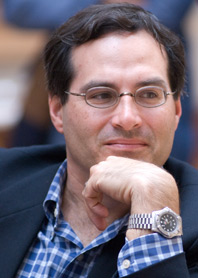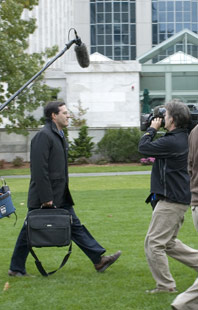Elliott Bennett-GuerreroStriking a balanceNOVA: Has your career been what you expected when you went to medical school? Elliott Bennett-Guerrero: I would have never envisioned that I would end up doing exactly what I'm doing now specifically. But overall, my career has met my expectations. Ultimately, I love what I do. I help people in different ways, both by taking care of patients as well as by doing research. Q: If you had the chance to pick a career again, would you choose to be a doctor? Elliott: Oh, definitely. I have absolutely no doubt that if I had to choose again, I would become a doctor. It's a great privilege to be able to take care of people. And even on my worst day—when I'm unhappy, stressed—and I see all the suffering in patients, it makes me realize that I'm still having a good day. Q: In anesthesiology, do you miss out on developing the long-term relationships with patients that doctors in other specialties have? Elliott: Well, a lot of medical students are very interested in what's called continuity of care, in specialties where you get to know patients over many weeks or months or years. But it's really a double-edged sword. With continuity of care, you get that special relationship with the patient and family members, but there are obligations with that. If you are trying to leave the hospital at six o'clock to go to your son's baseball game, and your patient has deteriorated and has gotten very sick, there's a strong sense of obligation and guilt. Should you do something with your son, or should you stay in the hospital and deal with the patient who's sick? Q: Is that less the case with anesthesiology? Elliott: In anesthesiology, there is continuity of care on a very short time frame, but if I don't work for a week in the operating room, I don't feel like I'm letting anybody down. There's no patient who's expecting me to be there. Whereas if you're a surgeon and you operate on somebody and he's in the hospital for five days, his family expects to see you every day. Q: Did you consider this when you chose your specialty? Did you evaluate all the lifestyle issues? Elliott: There was a strong element of luck in terms of choosing the specialty I did. I tell medical students now that I think the hardest thing for them is to try to predict what they'll enjoy doing 10 or 20 years down the road. When I was a medical student, I used to love being up at three in the morning in the emergency room, but as you get older, that gets harder and harder. Q: In your third year at med school, you said, "I'm like a kid in a candy store, there are all these specialties." [For more on the range of possibilities, see M.D. Specialties.] Elliott: Sure. As a medical student, there are many things that seem exciting or interesting. And it's very hard for somebody who is 25 years old to predict what it will be like being 30 or 35 or 40 or 50, and having a family and having to balance work and family life. Q: Does anesthesiology allow you to spend more time with your kids, your family? Elliott: Sure. There are some anesthesiologists who work extremely hard, make a lot of money. They've chosen a certain lifestyle. I feel like I need enough money to pay my mortgage, but I don't feel a need to be extremely wealthy. I don't think that that's gonna make me happy. Running clinical trialsQ: What do you do in the research half of your career? Elliott: The Duke Clinical Research Institute, where I work, coordinates big, multicenter clinical trials across a range of therapeutic areas—cardiology, psychiatry, many things. I'm the head of an area that coordinates trials on surgical patients. We do trials for industry sponsors as well as for the NIH and other government sponsors. I spend about two days a week working in the operating room and the rest of my time at the Institute. It's nice to have a variety of things. I like working in the operating room, but, honestly, I wouldn't want to do it five days a week, 52 weeks a year. "I feel very much at peace with who I am and with what I do." Q: For the clinical trials, is there a good deal of business work as well as scientific work? Elliott: When you're coordinating multicenter trials, you're negotiating contracts with companies as well as with research sites. So you are part scientist, part businessperson. Some trials can cost as much as $50 million. So it's really an enormous undertaking. Q: Do you enjoy the business side—dealing with lawyers and drug companies? Elliott: I do enjoy the business side of clinical research, although I don't think I would want to do it day in, day out. Looking back[Editor's Note: The following interview was done with Elliott and his wife Karin. At various points, they watched footage showing Elliott as a medical student and young doctor.] Q: When you look back at yourself as a med student, particularly the scene of you learning how to do a pelvic exam, how does it make you feel? Elliott: It's weird. On one hand, I feel like I am a lot older. But in some respects it feels like it was yesterday. That may be, in part, because I work with medical students and residents in the hospital. I constantly see young people going through their training, kind of anxious and fumbling as I was. Karin: I feel bad for him. He looks so nervous. [laughs] It makes me laugh. Q: We have footage of you when you met your first wife. When was that in your career? Elliott: I was in my third year at medical school. Q: Did you want to get married before your residency? Elliott: A lot of people get married right before they start residency. I didn't feel pressured to get married, but it certainly felt like a reasonable time to get married. Q: Karin, if you had met Elliott at that time, do you think you would have gotten married? Karin: No. [laughs] My father's a neurosurgeon, and he was always on call, almost every day. So I just don't think I ever would've even considered dating or marrying a medical resident. Elliott: Karin and I talk a lot about how we met at a good time. I was at a point in my career when it was a lot easier for me to focus on my family. Had we met when I was 20 years old, or 25, things would probably be different. Q: Did the stresses of internship and residency, the long hours, contribute to your first marriage ending? Elliott: I think they contributed significantly. When you do your internship, it is exhausting. But it's also exciting—you're doing what you were looking forward to doing through medical school. So, there's a part of you that's actually excited to be at the hospital and working really hard. Karin: (chiming in, overlapping) Don't you still feel that way? Elliott: I think for a lot of interns, you'd almost be lying to your spouse to say, "Oh, I wish I wasn't at the hospital. I wish I was just with you." Embracing traditional rolesQ: Karin, do you relate to Elliott's feeling of wanting to pour himself into his work? Karin: Well, there's just no part of me that wants to get up and go to work in the morning. I love being with my kids, and I always knew I wanted to have children and stay home with them. So, I just feel really lucky that I have a husband who does get up and go to a job and doesn't care if I work or not. I think if I had a big passion and wanted to have a big career, Elliott would be supportive of that. But he definitely likes me to take care of the kids and so... Elliott: (chiming in) I think it's great if women want to work. I have a lot of respect for that. But from my perspective, it's a lot easier having a wife who is not working outside the home now, so that if I'm at the hospital and a meeting comes up and I need to stay late, I know that she's there. Karin: It's just never been an issue between us, because I knew I wanted to marry somebody who could support me and didn't care if I worked or not, and he knew he wanted to marry someone who was focused on having a family. "I enjoy the challenges of trying to improve in whatever I do on a daily basis." Elliott: I've come to realize how nice it is being married to somebody who's focused on the home and having more traditional roles. I got kind of lucky in that way, because I don't think I was always of that mindset. Karin: Really? Well, since you met me you were. Elliott: Yeah. What I'm just saying is that many other [young doctors] were thinking, "Oh, I'm more likely to get along with somebody who's a doctor or somebody in my same field because they can understand what I'm going through and I can understand what they're going through." That's very pervasive. But in retrospect, I think it's really nice having somebody who can focus on the kids and the home, so at times when I'm working very hard, I can focus on my job. One of the keys to being happy in life is to know yourself and to really be honest with yourself about what makes you happy. Sometimes it can take many decades before you really figure out what you want out of life. Q: Do you feel you've reached that point? Elliott: Well, I feel tired [laughs], I feel tired a lot. But honestly, I feel very much at peace with who I am and with what I do. I definitely felt a lot more anxiety when I was younger about what I was gonna do and what kind of person I was gonna become. At this point, there's a lot less uncertainty. Karin: I think we have a really nice life here. Personality typeQ: Do you think that medicine has molded your personality? Elliott: Wow, that's a broad question, and I'm sure the answer is yes. It's not something that I've thought a lot about. One thing that's had a major impact on my life is that I just really treasure living life, and I try to live life to the fullest and appreciate what I have now. I'm 43 years old now, and in two years, I might be dead. I see 45-year-old people who develop brain tumors or aneurisms and die. I get a little bit sick of hearing people complain about their lives when, compared to a lot of the patients I see who are suffering, I think they don't have much to complain about. Q: Has being a doctor shaped you in other ways? Elliott: Being a doctor, I've learned to be more patient. When you work in a hospital, you work with many different nurses and other doctors. You need to be patient and understanding, because not everybody is the same, and people work well in different ways. Q: You've now taken up golf, and you seem to be quite serious about it. Why do you take it so seriously? Elliott: I'm an intense person. I live life to its fullest. I do that in my work, I do that with my family, and I do that with my hobbies. I love playing golf. I love thinking about the golf swing, learning how to play golf. You know, it's an incredibly challenging game. So, it's kind of a continuation of my personality. Q: What's your goal in golf? Elliott: Just to get as good as I can get. I just like the challenge. At work, I've kind of plateaued in terms of my ability to do procedures technically. In golf, I can challenge myself physically in ways that I can't do at work anymore.
I enjoy the challenges of trying to improve in whatever I do
on a daily basis. I think that's really what you need to do if
you want to do good research. The goal is not to win a Nobel
Prize. The goal is not to become a full professor. The goal is
not to have 100 publications. The goal needs to be to answer
interesting and important questions day to day, week to week,
month to month. If you do all those things, then, with time,
you will achieve some of these other symbols of status. |
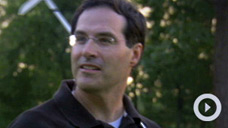

Watch Elliott Bennett-Guerrero's journey from med school to midlife in scenes from "Doctors' Diaries." (Running time 11:30) Also, see bonus video of Elliott and his wife Karin watching scenes from the program. 
While not yet a doctor in the late 1980s, Elliott strikes a pose in a promotional photo for NOVA's first installment of the doctors series. 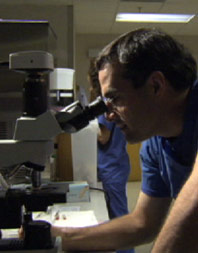
The various facets of his career allow him to be part doctor, part scientist, and even something of a businessman. 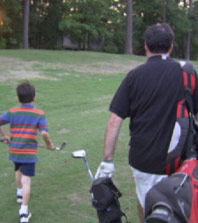
Hitting the links with his son. Elliott quips, only half joking, that becoming a good golfer is as tough as becoming a doctor. |
|
|
|
|
Interview conducted in May 2008 by Michael Barnes, producer of "Doctors' Diaries," and edited by Susan K. Lewis, senior editor of NOVA Online Doctors' Diaries Home | Send Feedback | Image Credits | Support NOVA |
© | Created February 2009 |
|
|
|







